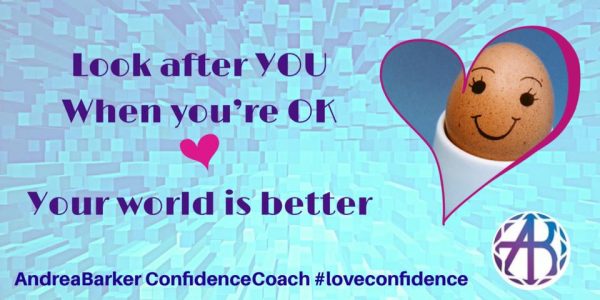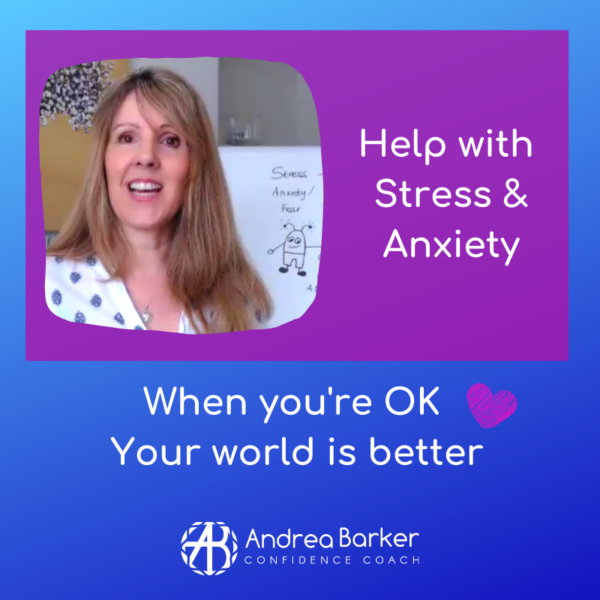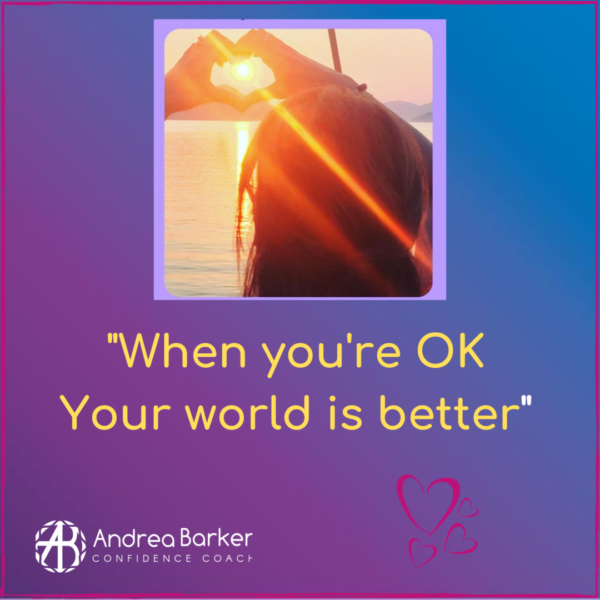inspirational
Small ways to stay Happy & Healthy
Staying Happy and Healthy is crucial to your well-being
If you are feeling low or anxious – here are some small things you can do to help you stay Happy and Healthy.
Do keep connected with others, in what ways you can.
Keep moving and get outside if you can, or buy some houseplants to bring the outside in, and feel the benefits.
Playing games with others is a great way to have fun and be connected, all you need is a pack of cards – why not revive some traditional games.

Look after yourself
Look after yourself – you’re worth it, and when you’re ok – life flows better, and you feel more able to deal with any stresses.
Andrea
Ways to cope with Anxiety and Stress during Lockdown
As we head into our second lockdown, how can we reduce anxiety and stress?
A return to restrictions and lockdown has seen Anxiety levels soar again, in all ages.
It has been a year that has touched everyone in some way. One we certainly won’t forget.
Continued uncertainty and not being able to plan for the future, can give the feeling being anxious, stressed and not being in control. We are left wondering when ‘normality’ will return.
This can also create stress and overwhelm, as our mind becomes hypersensitive to the continued threat to our well-being and fears go into overdrive.
As the weather changes too, how can we manage our anxiety, or help those close to us?

Following on from being on Pat Marsh’s show, on BBC Radio Kent – I have listed the advice spoken about and more…
Focus on what YOU can control
Like your getting up time, when you have lunch or some exercise, whether indoors or outdoors.
A routine is a great thing to have in the week, especially if you are not able to continue your normal routine, to give you structure. Relax at the weekend. This will help you feel less anxious to keep the days of the week and the weekend seperate.
Also, Stick to a good bedtime, to get important sleep you need. Waking up refreshed is so much better for you and will help you cope better day to day. Our body repairs and our mind helps file away our day.
If you wake up in the night – listen to the calm silence and then task your mind to count down from 300 – gently keep bring your mind back to the countdown and you will go back to sleep. It is a good idea not to turn on phone screens if you wake up, because the light affects your sleep hormone, which promotes sleep.
Stay connected in whatever way you can with family and friends. This is the time to keep talking. Talking to friends and family about how you feel, or listening to others, can really help.
Pick up the phone and have conversations. Check on your neighbours. You can meet one other person for a walk, so even if it is meeting for just a half hour walk, it is well worth doing. Wrap up if it is cold and prepare to be invigorated!
If you feel anxious and like thoughts are whirring around your head – get a plain piece of paper and write everything down – then rip it up. It feels good.
Try to limit the news to once a day, just so you can keep in touch with what is happening that may affect you, then concentrate on what you can control within your own environment – whilst following the guidelines.
Other things you can try:
- Join virtual group or create one – like a model club, knitting, photography… there are other things too, if you are not wanting to use a device or computer.
- Have quiet time and read, colour, draw or paint and do crafts, or a jigsaw
- Try calming mindfulness – focus on your breathing and think of things that make you smile and feel happy
- Make a calming glitter jar – literally fill an empty jar with water and glitter – seal and enjoy its calming affects
- Get a stress ball – or something lovely and touchy-feely for when you feel anxious and stressed or pop bubble wrap!
- Listen to music, sing out loud and dance – music has wonderful power to uplift you and change your mood instantly and it lasts
- Watch things that make you Laugh, laughing really is a tonic.
So, give a few things a good and you will feel better
Feeling panicky?
If you are feeling panicky:
- Breathe – breathe in for the count of 3, hold for 3, breathe out to the count of 3 and hold for 3 – do this three times and you will feel calmer
- Tell yourself ‘I’m OK, I am calm’
- This could be useful to try: Focus on 5 things you can see, 4 things you can hear (even if you create the noise) 3 things you can touch. This grounds you and helps you feel calmer.
Really not feeling yourself?
We can all be feeling anxious and stressed, but if it is taking over your day to day living, affecting your sleep and eating habits, then do seek help from your GP, and the many organisations available to get the support you need.
You are not alone: 1 in 4 people suffer anxiety.
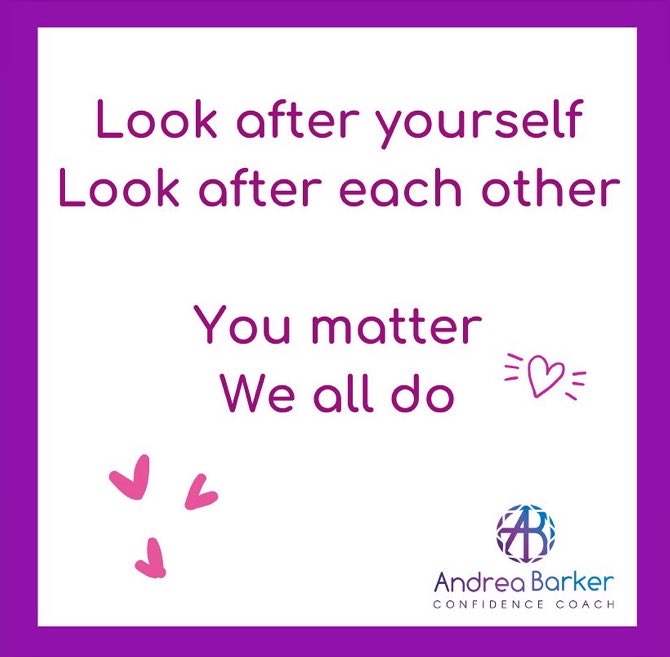
Andrea
Returning to school after Lockdown
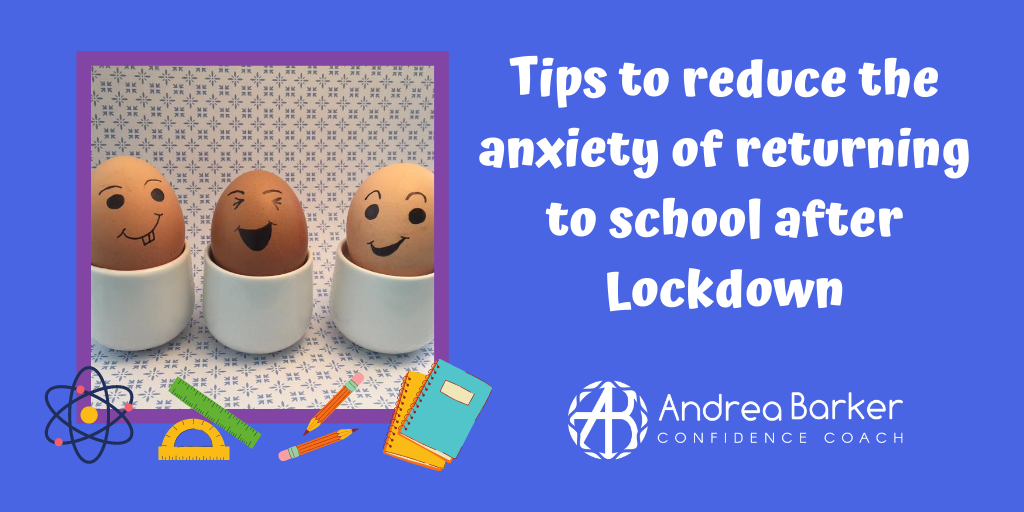
Tips to help reduce the anxiety of returning to school after Lockdown
Covid19 pandemic of 2020 and the resulting lockdown, has certainly had an impact on all of us, not least our children causing much anxiety. So, how can we help?
*firstly, do seek professional help if you feel you or your child’s mental health is of concern.
As lockdown eases further, children of all ages and their parents may be having feelings of anxiety around returning to school after such an extended break and worrying about how safe it is for their children, which is understandable.
For many children, lockdown has been a happy & safe experience that they may not want to change.
Many children have desperately missed their friends, teachers and the routine school offers and have also been missing out on extra-curricular activities.
Children & young adults can respond in different ways:
Maybe becoming withdrawn; be unusually clingy; be ‘naughtier’ and seek attention or lash out and can show their concerns by really worrying about what might happen but find it difficult to say how they feel.
Things that may help
- Children mostly take their cues on how to deal with a situation from the adults around them.
- Be aware of using negative language, or talking about your worries within your child’s earshot, about them returning to school.
- If your child is worried about going back to school, it isn’t enough to say, “everything will be alright”.
Acknowledge how they feel, and that it is ok if they feel worried and then help them to deal with it and find good coping mechanisms
- Older children – let them know it is Ok to feel anxious and that the feelings can just be some apprehension and are the same for excitement too! That after day one or two they will feel much better
- Try to limit the news coverage and stick to things you can control within your environment and your child’s school.
- On a practical level – connect with parents and children your child knows from school. Arrange a safe play date or meeting. This helps you share your worries too.
- Walk or drive past the school a few times before the term starts. Also, get your child involved in getting their uniform and bag ready.
- Encourage your child to talk about what they like doing at school and their friends
- If your child is moving from primary to secondary, remember that their anxieties are real, encourage them to talk over how they feel.
- Most schools have good information on their website about the safety measures they have put in place. Contact the school if you are particularly concerned.
- Some Children worry about leaving their parent alone at home…reassure them that you will be fine.
- For most children of all ages – after the first few days of getting back to school, a routine will soon be found, and they will have survived and so will you!
*SHOUT – part of Heads Together a useful texting service for people struggling with Mental Health. Visit Childline, Young Minds and Anxiety UK’s websites too, all packed with great advice.
Be kind and look after yourself – what does that mean?
How often do you put yourself first?
I have had the pleasure of being on BBC Radio Kent, Pat Marsh’s show, over several weeks now. We have been talking about many things to help your Mental Health and Well-Being.

Today we talked about being kind & and looking after yourself.
Putting yourself first at times matters – it is essential for your well-being to top up your own cup, so you have something to give.
It reduces your stress levels and helps you feel happier, which is better for you and the people around you.
Some people find it hard to put themselves first, worrying that it is a selfish thing to do; which can result on taking on too much, feeling overwhelmed, tired and stressed.
So, how can you look after yourself?
There are several things you can do as listed below, to look after your Mind Body and Soul
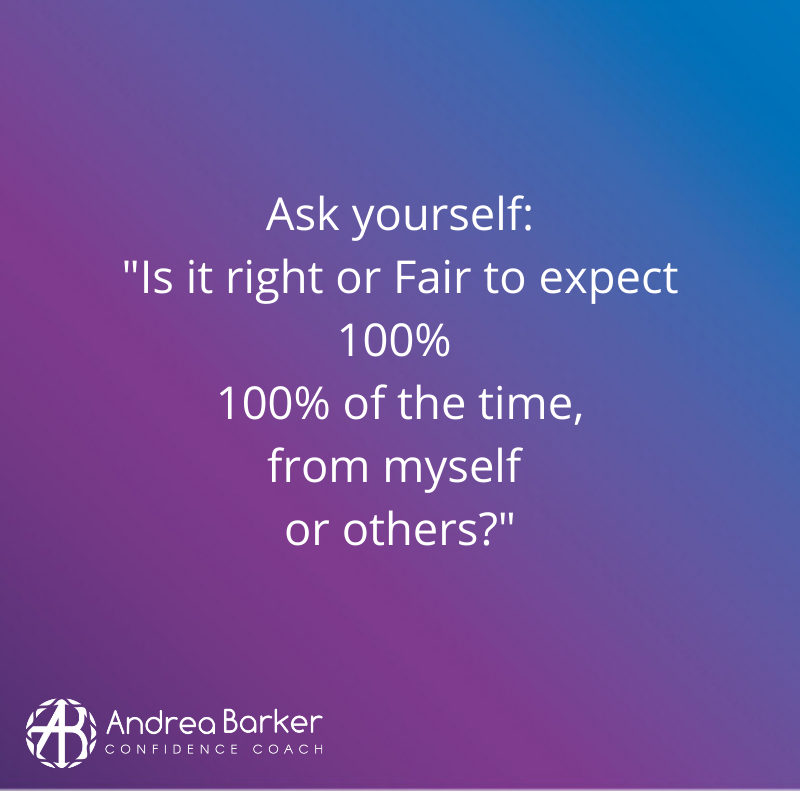
- Start by taking the pressure off yourself to be ‘perfect’ or things to be done ‘perfectly’ and to be 100% all of the time. A great question to ask yourself; “Is it fair to expect 100% – 100% of the time?”
- A rule I like to live by is 80 / 20. 80% of the time do what you know you should – 20% of the time do what you like doing. This creates a great balance and avoids you trying to cut things out altogether which can be a hard thing to do – just adding to pressure or stress.

- Eat a wide variety of wholesome foods that nourish and sustain your body and mind. Good nutrition helps to keep your body healthy and more able to fight off disease. When you feel healthly you can do more things well, which helps you feel happier.
- Keep Hydrated Keeping yourself hydrated helps you think more clearly, and your body functions so much better when well hydrated.
- Exercise is good for your Mind Body and Soul – it keeps you flexible and fit, reduces stress, gives you headspace and much needed ‘time out’ and reduces the risk of disease. When are body and mind are healthy we feel so good from the inside out and life flows better.
Other important things are;
- Get plenty of sleep. The benefits of a good sleep can not be underestimated – our mind filters and files our day, our body repairs and children grow. I’m an advocate of the power nap – a great way to top up on sleep.
- Play and have FUN do what you love doing, have fun and laughs – it is so good for your mental well-being. Doing things you enjoy is so important. When was the last time you factored some FUN into your life as a priority?
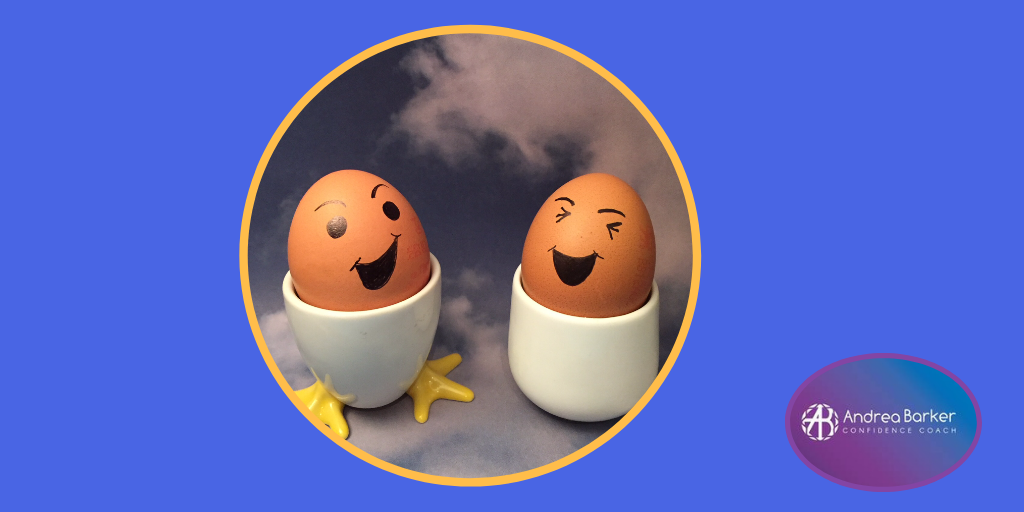
- Looking after your spiritual health is an important part of over health and well-being – whether it is meditation, religion and prayer, the outcome can be an inner sense of peace.
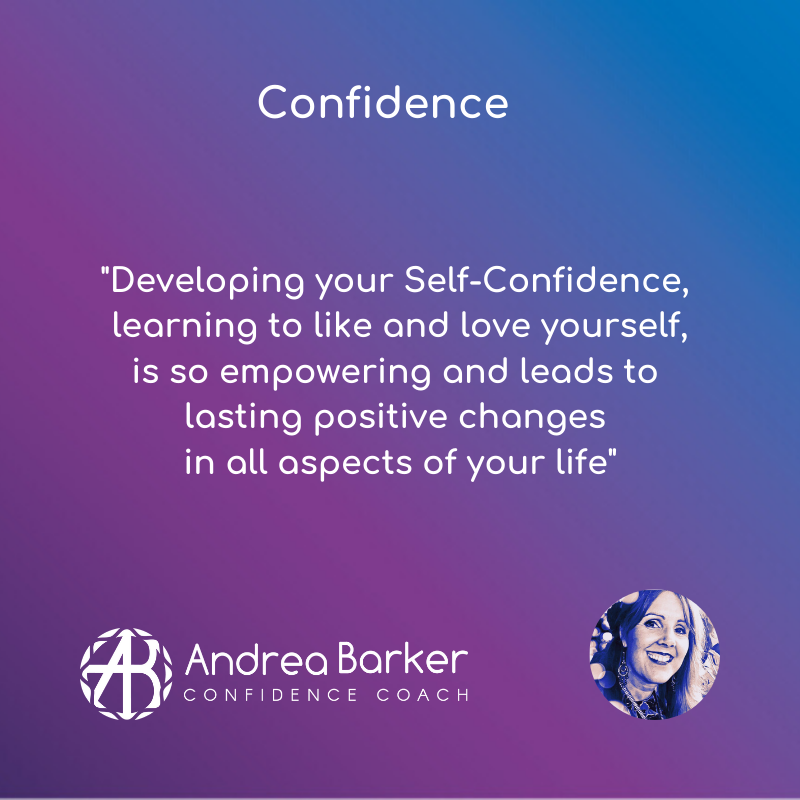
- Developing Confidence in yourself learning to say YES to what you want to do, and NO to what you don’t want to do, or maybe don’t have the time to do.
- Many people find that little word NO a difficult word to say – so, try buying your self some time to decide what you want to do by saying something like, “Let me see if I have the time to do what you ask, to make sure I can do the best job for you”
- Learn something new learning a new skill not only expands your mind and feeds your interest, giving you a wonderful sense of achievement. As a result of doing something new – it can open up opportunities for new experiences, or friendships.
- BE YOURSELF – You are the only you there is. Embrace who you are. Get to know yourself and appreciate your achievements and skills. This will help you feel so much happier and confident.
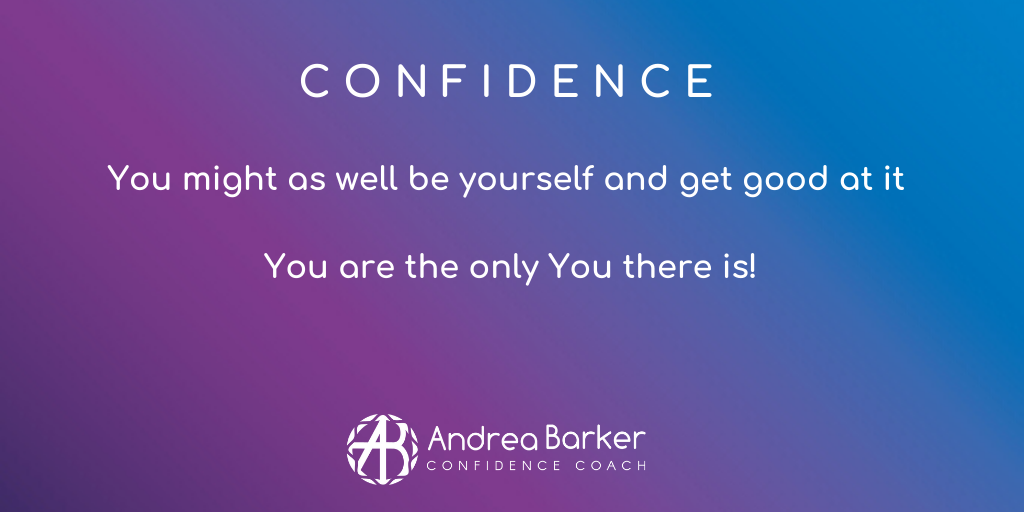
There is so much more I could add!
TAKE CARE OF YOU – YOU MATTER
Andrea
Positive things to help you feel happier about Lockdown, as restrictions begin to lift
Focusing on positives helps your Well Being
As lockdown was announced on 23rd March 2020, to restrict the spread of Coronavirus; could we ever have anticipated how much day to day living and the fabric of our lives would change?
That terms like ‘Stay Home’ ‘Lockdown’ ‘Social distancing’ and ‘Pandemic’ would be commonplace in our conversations.
It has been an anxious, and challenging time, with heart aching tragedy for too many. Businesses, schools, whole communities and cities shut and eerily quiet. So many of us missing family and friends and having a hug, being able to meet up for a meal, or celebrate a birthday, a new arrival or to grieve.
However, people have also come together and embraced the sacrifice for the greater good, and for that we should be immensely proud.
“Though we have had and still have much uncertainty and are all in the same storm, as with anything, we will have our own unique experience and how we weather it will be different for us all.”
Our Mental health and Well-being is incredibly important, and more so than ever at the moment.
Thankfully, people are more willing to talk about how they are feeling. People are having genuine conversations – which I really hope stays with us, as people find that speaking out and opening up is so much better, and a far more courageous step to take, than locking down emotionally, especially when people and organisations are so willing and able to help.
If you are feeling anxious, take things day by day, concentrate on what you personally can control and do seek help and support.
Thinking of the positive things you have liked and enjoyed during this time helps you feel happier and uplifted. Try writing them down to keep.
*Spending quality, guilt free time with your family. One young person said to me; how much they had enjoyed reconnecting with their otherwise busy parents! and how good it had been to relax and play games together.
*Having time to appreciate your home, garden and local area – including getting to know your neighbours.
*Maybe, you have read some books for the first time in a long time.
*If you are working from home, it could be how much you have appreciated not having to commute. Some people working from home have found they have been more productive and more connected with colleagues, which could bring about more flexible working in the future?
*You could be a student that has enjoyed home schooling, or a parent that has survived it better than you thought you would, with a new appreciation for teachers?!
*Is it that you can hear the birds singing on your new love for a daily walk?
*Are you one of the many people rediscovering the love of baking or cooking?
*Have you enjoyed the giving and receiving of wonderful acts of kindness and how thoughtful and caring people have been?
*Possibly you learnt how to do video calling and found getting many people together on a call has been easier than you thought, and quite a revelation?
Some people have been worried that they haven’t achieved enough! Do take the pressure off and be kind to yourself, especially as this has been completely new for us all.
Try writing a list or write a journal / story about your experience and credit yourself for the things you have achieved like:
‘I survived home schooling’ or that you actually relaxed and read some books; connected with your family; did more exercise; completed a puzzle, de-cluttered and tidied up; helped others in your family; did acts of kindness for keyworkers and the NHS; like putting art in your window to cheer people up, making masks, donating or fund raising in what way you could. Maybe you took the step to talk about how you feel, or learnt how to use video calling for work, or went on a virtual date…
As we prepare to move forward and Lockdown restrictions to relax further, think of the things you would like to preserve and keep doing.
What have you learnt?
It is important for us to focus on what we have learnt from this crisis, as it is from any crisis. To decide what we would like to take from the experience, especially as it is possible we will never have a time, or time like this again.
Winston Churchill is quoted as saying ‘never let a good crisis go to waste’. Arguably there is nothing ‘good’ about a crisis, however, there are always exceptional creative ideas born from adversity, amazing resilience, bravery and kindness shown by others and from ourselves too, which can surprise us.
This creates an opportunity for us to mine great learning and wisdom, to ensure that what we all have, and are going through, in some way is worth it.
love and light
Andrea
Help with Anxiety during Covid19
Anxiety can happen and increase for anyone when there is uncertainty, especially around change that does not seem to have clarity – like the current relaxation of Lockdown & just when you may have got into a routine!
Ways to help your anxiety
Be Kind to yourself if you are feeling anxious, it is valid to be feeling worried.
Make sure you talk about your fears with people you trust.
Remember this is unchartered waters for us all.
Focus on what you can control like:
• Still observing social distancing when going out, and integrate yourself slowly to doing more things
• You can wear a facial covering when on public transport, or in a queue, though do remember keeping your hands clean and avoiding touching your face as much as you can is the best way to avoid the spread of any infection
• If going back to work – speak to your employer and other colleagues on what works for you all, and recognise that tensions may be high for everyone, until you get into a routine with a new way of working – give yourself and everyone else time to adjust
• Children going back to school – schools will be working out the best ways to do things – do raise your concerns if you have them, or suggestions that may help.
• When your anxiety feels like a 7 – 8 – 9 or 10
*Imagine you are pressing a ‘Pause button’ which gives you time out to
*breathe in and out slowly and deeply
*think of a calm or uplifting colour wrapping itself around you like a hug
* ask yourself what can I do that will make me feel better right now?
*Maybe you can talk to someone?
*Turn up some uplifting music
*Go for a walk
*Bake or cook something good to eat…
• As always try to reflect on the positives in the situation
• Be grateful for what is good in your life right now.
I hope this helps
Andrea
How to manage Anxiety and Stress
Look for positives, to reduce Anxiety & Stress to help your Wellbeing
We are in uncertain, challenging unchartered waters for sure, and as I see it there are certain facts that could offer some comfort:
We are all in this together, Covid19 the most micro of micro-critters has united us all!
*The only sure thing is that it will pass, and like a hurricane rips through an area and leaves devastation, we will rebuild, recover and move on. Humans are immensely resilient.
*Times like this reveal a sense of community, connecting with people in your street and many acts of kindness, and heart-warming stories.
This is a huge opportunity for reflection and to re-evaluate how we live, what’s important to us and to be valued and how we do business. For example, as human activity has ceased across the world, wildlife has flourished!
From adversity can come amazing creativity and inventiveness, with new and exciting ways to do things and of course, in the right context – humour, which we may need more than ever. You can’t underestimate the power of laughter
Some people will be having unscheduled unique time with family, young children especially will relish having family at home.
*On that note, do spare a thought for those key workers, working around the clock to keep things going and looking after those who are ill and vulnerable, and those people living alone.
Anxiety and Stress
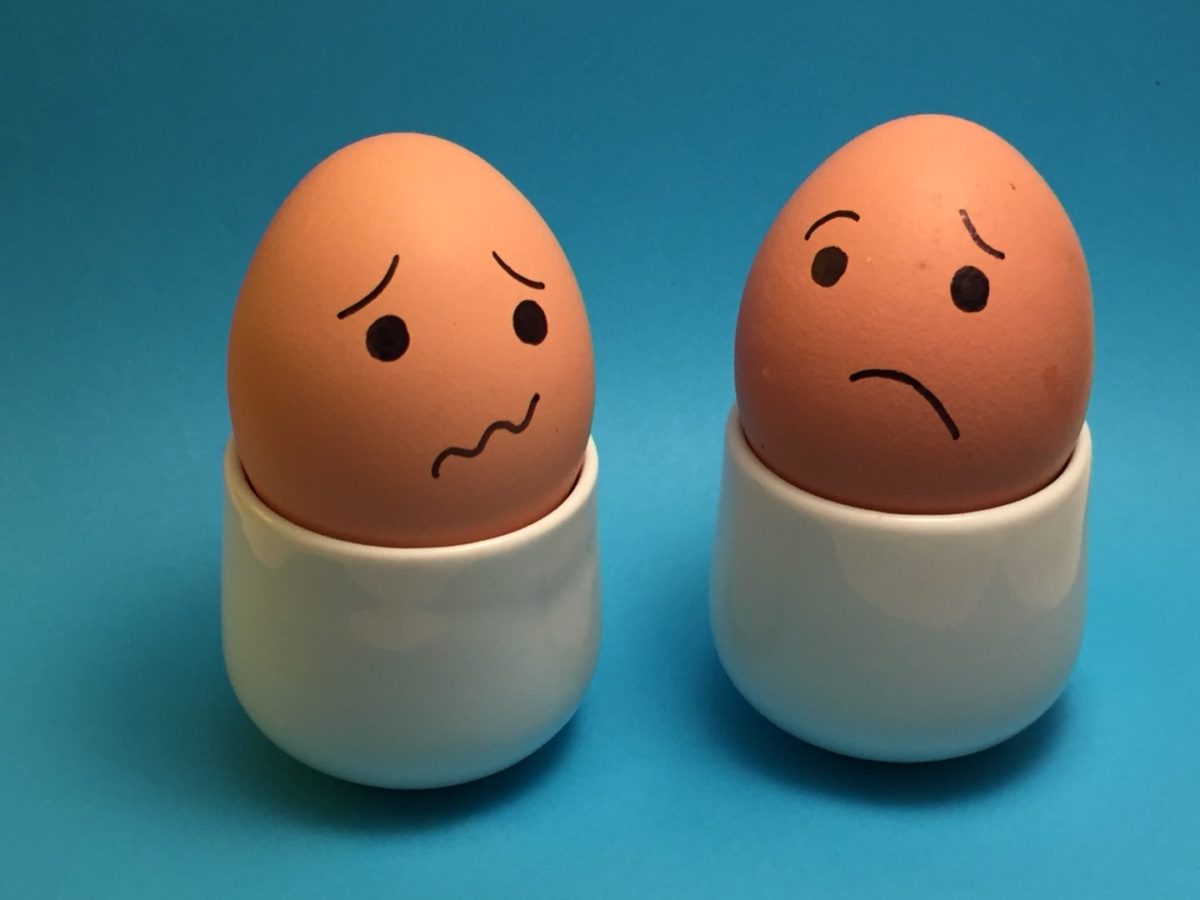
If you are feeling anxious, stressed, worried, uncertain or frightened at the moment, or anxiety levels are worse than normal, you are definitely not alone.
It is OK to not feel OK, to feel the way you are feeling, most especially in such unprecedented times and especially as currently we have no end date to the pandemic.
What is important is how you deal with how you are feeling, to reduce stress and anxiety in the best way possible for you, and to improve your overall wellbeing and to take things day by day. *There are links at the end of the article
Stress is a normal reaction to feeling threatened and under pressure, it propels us into action, so we can get things done and find solutions.
Undue and prolonged stress, with no solutions being found, compromises our health. It is important to find ways to ‘destress’ and task or time manage in a different way.
Anxiety is a natural response to protect us from threats to our safety, and keeps us safe.
Our body reacts to get us ready to respond and Fight Fright (freeze) or Flight (run).
Which can make our heart pound in our chest and beat much faster, making our breathing quicker. We can also feel sick and sweaty too.
When we are worried that something might happen or happen again (if we have had a negative experience) or have feelings of uncertainty and feeling like we have lost control, our body will respond in the same way to the possible threat, as though it was a real threat. We can then feel anxious as our heart pounds… which leaves us feeling worried, anxious, uncertain and out of control. When this keeps happening, we are then said to be ‘suffering with anxiety’ and then the Flight or ‘run’ response can turn into ‘avoid altogether’
To reassure anyone who feels like this, you are not doing this on purpose, but the important thing now is what to do about it.
During these times of real uncertainty, here are some tips and advice for you:

*Firstly, your feelings do matter, and if you are really struggling, with self-isolating and social distancing, then do reach out to others. Acknowledge how you feel and try some of the tips to follow and use the links or numbers at the end of this article.
*Concentrate on what you CAN control, day to day, and literally ground yourself in each day, and deal with what you can do. Covid19 itself is out of your control. All we can do is put the measures in place to try the best we can to limit the effects, protect the most vulnerable and prevent a sharp peak. Most people will suffer mild symptoms.
*If your anxiety soars and you feel like you are panicking, tap several times below your collarbone, relatively hard and sing a nursery rhyme and tell yourself ‘I am OK’ Go back to the things you are in control of, even if this means cleaning out a cupboard, going for a walk around the block or turning up the music.
lots of other things you can do
*Stay connected with friends, family and colleagues, school, college or Uni friends – ringing or video calling is great, to really feel connected. Ring someone you haven’t spoken to in a while or send an uplifting card. Try and get into the fresh air, maintaining a safe distance with anyone you might meet, and no hugging, shaking hands or sharing personal items – this will change once time has passed, it is in place to protect those people in society that are the most vulnerable to being seriously ill due to Covid19, that may not be you, but we are in this together, to protect each other.
*Help or connect with someone in your neighbourhood that could be isolated, go about this safely and wisely and never put yourself at risk – there are some good groups already to be a part of. *Do authenticate any group.*
*Join supportive practical uplifting groups through social media or set up your own ‘virtual’ meet-up over coffee, or just to chat.
*It is best to stick to the facts we have right now. Only update these facts from absolute reliable sources. So, avoid the scaremongering on social media, with people’s opinions that can be skewed and limit your time on various platforms, unless supportive. Try to limit the news to once or twice a day and screen time overall.
What about work?
*For business or finance matters Gov.uk, local authorities and councils will have details, as will great organisations like FSB, Chamber of commerce and other local business networking connections and your bank. Do remember, things are changing daily, but will come clearer. This is very new for all of us. Things will become clearer.
*Have a routine – I can’t recommend this highly enough, most especially for those people not used to working from home or being at home with no work or school to go to presently. Stick to schedule of when you get up, have breakfast, exercise, do work, connect with people in whatever way you can, and go to bed. This schedule doesn’t have to be strict, so allow some flexibility and time to relax.
*For those of you who are homeworking, and worried about your businesses and jobs. Do keep an eye on what is available for you, as mentioned above. Think of ways you can stay in touch with your clients / audience. Can you write a blog, do a video to give tips to others or create things for people to participate in online in real time? This is where as businesses we may have to think of different ways to operate and diversify part of how or what we deliver. You may now have the time to learn a new skill.
look after your health
Physical health
*Get plenty of sleep – Sleep is essential to your overall wellbeing. Have a night-time, wind-down routine. Limit screen time, have a warm bath, adding lavender can help, as can having a warm milky drink, limit alcohol and caffeine. Try to keep your bedroom cool and well ventilated to promote a good sleep. If you struggle to sleep or wake up – don’t look at the time if possible, take slow breaths and start counting down from 300 slowly and keep bringing your mind back to the numbers – you will soon drop off again.
*Stay nourished and hydrated drink plenty of water, it keeps your mind clear and helps clear toxins from your body. During these times we are all more aware of food availability, which is not a bad thing, eat a varied diet and food that fills you up properly, so you avoid the need to snack, and if you do snack try to choose the healthier options you have available to you, as this maintains a good sugar level, enhancing mood and promoting a healthy immune system, which helps us to fight illness.
Exercise in whatever way you can; take a walk in the fresh air – nature is very grounding; it continues regardless and gives us a good sense of things moving forward still and helps balance our mental health. Get in your garden if you have one, do laps, exercise outside, or do some gardening, plant some seeds – something to look forward to, why not grow your own veg? Even if you only have a window ledge you can grow something. Why not dust off the interactive games’ consoles! Do yoga or pilates, or dance and move to music. Look out for the many people offering great workout videos on-line, start locally first – to help you keep connected with people in your local area.
Mental health
*Practice mindfulness and relaxation – great for reducing stress and anxiety. Controlling your breath is very calming and helps reduce anxiety – take in a deep slow breath for the count of 4, hold for 3, breath out for the count of 4, do two more times – this brings you back to the now. Look out for all the people in your area offering on-line sessions to follow. Like the exercise above, most people are doing this for free and there are also special workouts for children too. Give yourself distraction free time to relax. There are great Apps too.
*Take Time Out recognise when you, or the people you are with need quiet time, and ‘time out’ – you don’t need to schedule your every moment, or entertain children constantly, and it is more than ok during these times of isolation to have guilt free time to watch films, binge on a series, read a book, take a nap…and just have some quiet.
*Music is a powerful uplifting mood changer and helps us to be creative and gets us moving. Get those tunes on, children love to dance and sing. How about pulling out archived music! Many DJ’s around the country are doing live ‘club’ sessions for people to join in on during these times of social distancing.
What else can you do?
*Do puzzles, a jigsaw, pull out the lego, play games, knit, sew, paint, decorate, de-clutter, try a new recipe, bake, feed the birds or learn something new. Watch comedy and do try to have some laughter and fun.
*Finish that task you’ve been meaning to do! We all have something that has been put to one side, for when we have the time!
*Practice GRATITUDE – 3 good things a day – especially when you feel worried or uncertain, you may not feel like doing this, however this really grounds you in the now, and helps you to look around at what you do have, who you appreciate, maybe the new connections you’ve made, the birds singing, the quiet. Remember good things will also come out of this crisis, and gratitude helps you through tough times, and loss, as you reflect on happy memories, or things that have made you smile and laugh today. You can do this with children too – maybe get them to write down things on strips of paper and put them in a jar, to read at a later date.
*write down negative or angry thoughts that whizz around your head, then delight in ripping them up or shredding them – this is a powerful exercise to get thoughts out of your head without hurting anyone.
I really hope this has been of help to you.
Above all – do get the support you need if you feel particularly anxious, stay connected with friends and family – or reach out to organisations that can help.
Andrea

Extra Help
SAMARITANS free phone – 116 123
SHOUT – there is lots of information here, plus a texting service https://www.giveusashout.org/
ANXIETY UK
Support with Anxiety due to the corona virus https://www.anxietyuk.org.uk/coronanxiety-support-resources/
Help with talking to children about corona virus https://www.anxietyuk.org.uk/blog/how-to-talk-to-children-about-covid-19/
MIND – 5 ways to wellbeing https://www.mind.org.uk/workplace/mental-health-at-work/taking-care-of-yourself/five-ways-to-wellbeing/
CALM – Campaign Against Living Miserably – specially to support Men and run by Men https://www.thecalmzone.net/
I highly recommend Cruse to help with bereavment at anytime, but especially because things have changed in being there for loved ones when they pass and also due to retrictions when it comes to funerals https://www.cruse.org.uk/
Why do I procrastinate?

Ever asked yourself ‘why do I procrastinate?’
Is procrastinationg stopping you doing the things you really want to do, or really should be doing? Do you feel like your dreams are slipping away from you? Would you like to find solutions as to why you may be procrastinating? Here is some inforamtion, you can request my EBook if you would like to know more.
Stop your procrastination crushing your dreams
It is a normal process that most people go through – a form of contemplation, to decide whether to do something or not. This stage can sometimes become prolonged, due to fear, or being unsure and not feeling very confident, so that procrastination takes over leading to a job or task not getting done.
When procrastination becomes a real problem, is when this process happens often, leading to chronic procrastination. This can quite markedly affect our Self-esteem, and lead to us losing confidence and not allowing ourselves great experiences or opportunities. Like a new job, going for a promotion, dating, or joining in on things we enjoy. Or not ever showcasing what we can do and let the world see how talented we are.
There are many reasons from; Low Self =-Esteem, ‘Perfectionism’ Overwhelm, lack of effective planning, not having the right skills, being too distracted or bored even.
As many reasons as there are for procrastinating is matched by solutions. So, you can answer the question ‘why do I procrastinate?’ Once you inderstand your reason for procrastinating a little better, and have some solutions to work with, you can get going…
Some Solutions:
Learning how to plan effectively, using tools to help you.
How to break tasks or projects down into achieveble steps.
Prioritising tasks – to help you be more organised and avoid overwhelm.
Developing your confidence, recognising your skills and knowing when to ask for help.
Learning how to say NO.
Delaying gratification – this is about rewarding yourself after a task has been completed.
I have developed an EBook to explain more. There is so much to help you understand and to be able to fix your procrastinating and live a fulfilled and happier life, which puts you back in the game!
Please email me if you would like the free EBook with a lot of very useful information in it at: confidencececoach@andreabarker.co.uk or use the ‘Request an Appointment’ button and ask for the EBook
Andrea
Why not LIKE my Facebook page 🙂 https://www.facebook.com/AndreaBarkerConfidenceCoach/
Developing your Self-Confidence is so empowering – I know!
Self-Confidence is trusting in yourself, your abilities and knowing your potential. Self-Esteem is about liking and loving who you are so you can be the best version of YOU ✨
Sometimes I used to worry all the time what people thought about me, and getting things wrong, making mistakes and being a failure.
I strived constantly to do my best to fit in and be someone I wasn’t, to try and be liked and accepted. Often I was a ‘people pleaser’ trying hard to always do my best for others, being flexible, adaptable, not saying NO and taking on too much, and was constantly feeling like I was letting people down, as I was struggling to cope with all I’d given myself to do. I felt quite unhappy a lot of the time.
I always felt I should be ‘strong’ and rarely asked for help.
Things got worse after I suffered a head injury and my Confidence was on the floor, and I liked myself less.
After a long slow recovery, and working on my own Self-Confience and Self-Esteem and finding myself again, I know the amazing benefits, which is why I do what I do, and why I know that if you’re ready to make some changes, I can help you.
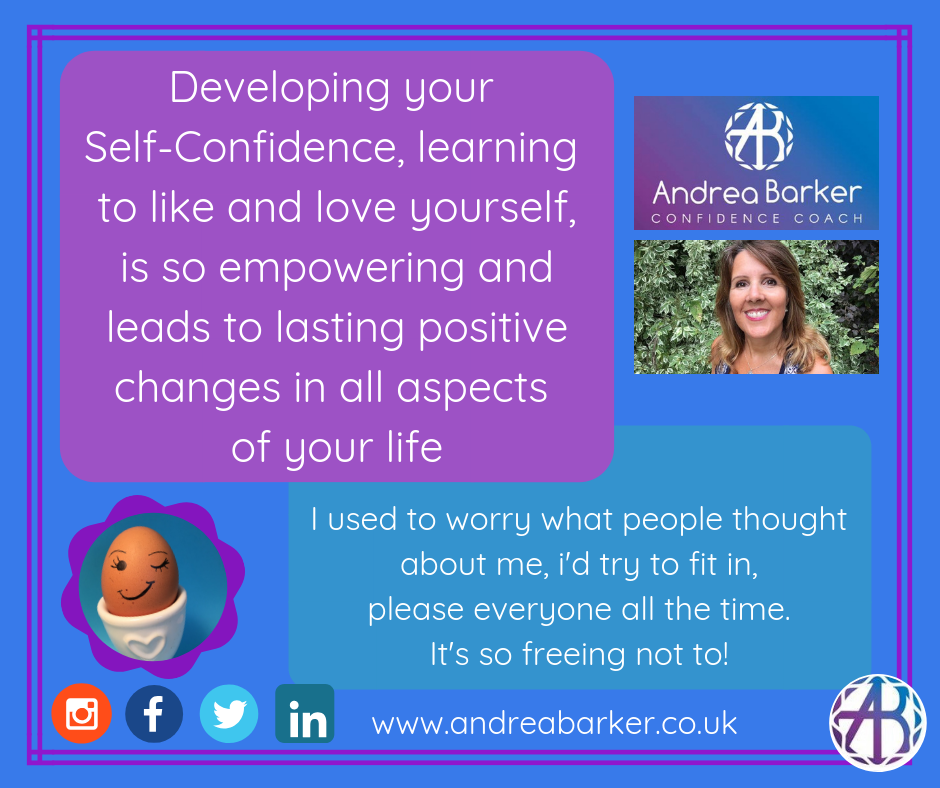
Taking a first small step on working on feeling happier about being YOU, leads to another step and another ✨
You deserve to be happy and feeling confident to be your best – when you do, You and everybody around you benefits 😊✨
Andrea
We all have Mental Health – understanding Mental Health issues is not always easy, we all need support
Mental Health has been a subject well promoted in recent years to create awareness, and for good reason.
After all we all have Mental Health, which impacts every aspect of who we are, the decisions we make and how we cope day to day with the people in our life and circumstances around us and includes our Self- Esteem levels; how we feel and think about ourselves and how Confident we are in our abilities and skills.
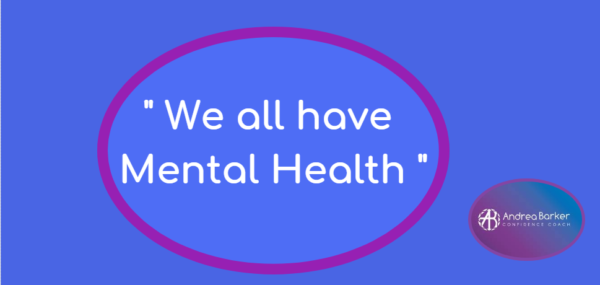
Maintaining a healthy Mental Health is essential and priceless, it is different for each one of us. It could be things like; being in nature, doing regular exercise, appreciating music, getting immersed in the arts, and spending time with treasured family, friends and pets – I call it ‘Soul Food’
There are times, for many reasons, when Mental Health could be compromised. No one person is beyond a Mental Health concern, issue, disorder or illness. 1 in 4 people at any one time – from all walks of life. It will always be unique to the sufferer, how it affects them and the people around them. Examples are; Stress, Anxiety, Depression, or Phobias, PTSD (Post Traumatic Stress Disorder), Neurosis, Addiction, and various other psychological / psychiatric disorders. So, understanding Mental Health is only a good thing, of course, to understand ourselves better, to help people help themselves and to support each other if we can – should our Mental Health falter.
Talking about how we feel if experiencing a Mental Health concern or having someone around who is, like a loved one or work colleague, is important, to start the process of getting valuable help and support, and getting on the road to recovery or learning how to manage the issue and realising we are not on our own.
Making that first step towards seeking help when you are struggling with your own Mental Health or that of someone around you, can take a lot of confidence and courage, but you will be glad you did – there is real strength in it, in no way is it a weakness.
There are many incredible people out there doing their best to cope with and help others, and there is also much support from great organisations, health professionals and therapists, helping us to understand ourselves and others, and what we, or they could be going through. It can sometimes be difficult finding the right support and help initially to suit you – don’t give up though, it is out there, and you can build a good support network for yourself, your family and in the workplace.
Sadly, I’ve seen a few posts recently dissing people around not supporting or understanding Mental Health concerns in others. To my mind we need to all be a bit more supportive of each other and I feel there are a few factors to consider before judging others, which prompted this article.
For most people it isn’t that they don’t care about people who may be having a tough time with their Mental Health, it’s more than likely that they don’t understand, as understanding Mental Health issues is not always easy, and people don’t always know what the right thing is to do and can fear saying or doing the wrong thing.
Some Mental Health issues are actually very complex, don’t make sense and don’t seem ‘logical’ and are difficult to understand. They are also completely unique to the person with the issue / concern or disorder, though there can be certain commonalities.
Sometimes the person affected can cease to ‘see’ the people around them and the impact their current state has on others, which can be hard to deal with and difficult for the people around them to make sense of. It can be upsetting to be around distressing behaviour that you don’t understand and not knowing what to do to help. Many people will try in the best way they know how – without always getting positive results from the person they want to help (for many reasons) and can be left feeling frustrated, hurt, upset, bewildered, and stressed themselves.
There can also be occasions when a person experiencing an issue will hide it, or deny there is a problem, especially from those closest to them, which of course means it is difficult to support them. This could be to protect others, or maybe through fear of losing their job, the possible risk of stigma, being misunderstood or bullied (thankfully things are starting to change for the better on that score).
Some people do fear and are wary Mental Health issues; maybe they have ‘been there’ themselves or had experience of a family member or close friend in their past and it’s too painful to revisit, and they just can’t cope with someone else’s challenging upsetting behaviour at that time.
We can have the most wonderful events, things to strive for and work towards which needs our energy and attention, or our own genuine concerns and stresses to deal with, like having a physical illness, our own Mental Health issues or times when we’re facing something challenging, getting used to a change and dealing with something new, or are feeling hurt, dealing with a tragedy or loss, that is the focus at that time, or just being incredible busy with work and family life.
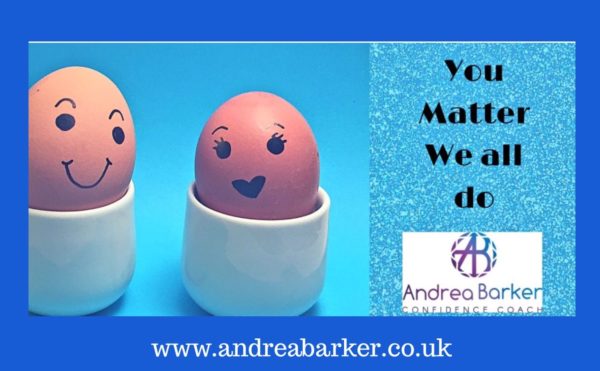
Life happens and can take over for all of us!
Sometimes people want or need to get on with their own lives, for their own reasons, we can all identify with that. It’s not selfish to and it’s not because they don’t care, but everyone needs times when they put themselves first, to be at their best, to be ok for their own well-being and also to be ok enough to cope with issues and challenges facing them or a person close to them, or to just get on with their jobs and family life. Maybe they are deciding to take the time to enjoy life, the people around them, celebrate achievements and how far they have come -challenges they may have overcome themselves – which is important.
Most people are kind and supportive and doing their very best, however no one is ‘perfect’ and everyone is capable of getting things wrong, making judgments, and hurting people – without the intention to, or maybe just don’t know what to do, so do nothing.
We all have times where we have felt we can’t cope ourselves, let alone with another person too and don’t want to – it isn’t wrong, just human.
A good thing to remember is; regardless of what is going on for you or others ‘You are doing the best you can in every moment, with what you know at the time, and so is everybody else – until you find a better way’
Most Mental Health issues can be overcome or learnt to be managed in a better way. There is definitely hope.
Life’s wonderful experiences and challenges teach us every step of the way – if we choose to and are ready to learn from them and being or feeling ready to face some challenges is key.
Every one of us walks our own path, at our own pace, with its highs and the lows.
Try your best to be kind to yourself and everyone around you
If you’ve read this far – thank You and I’d love to have your thoughts
Andrea

